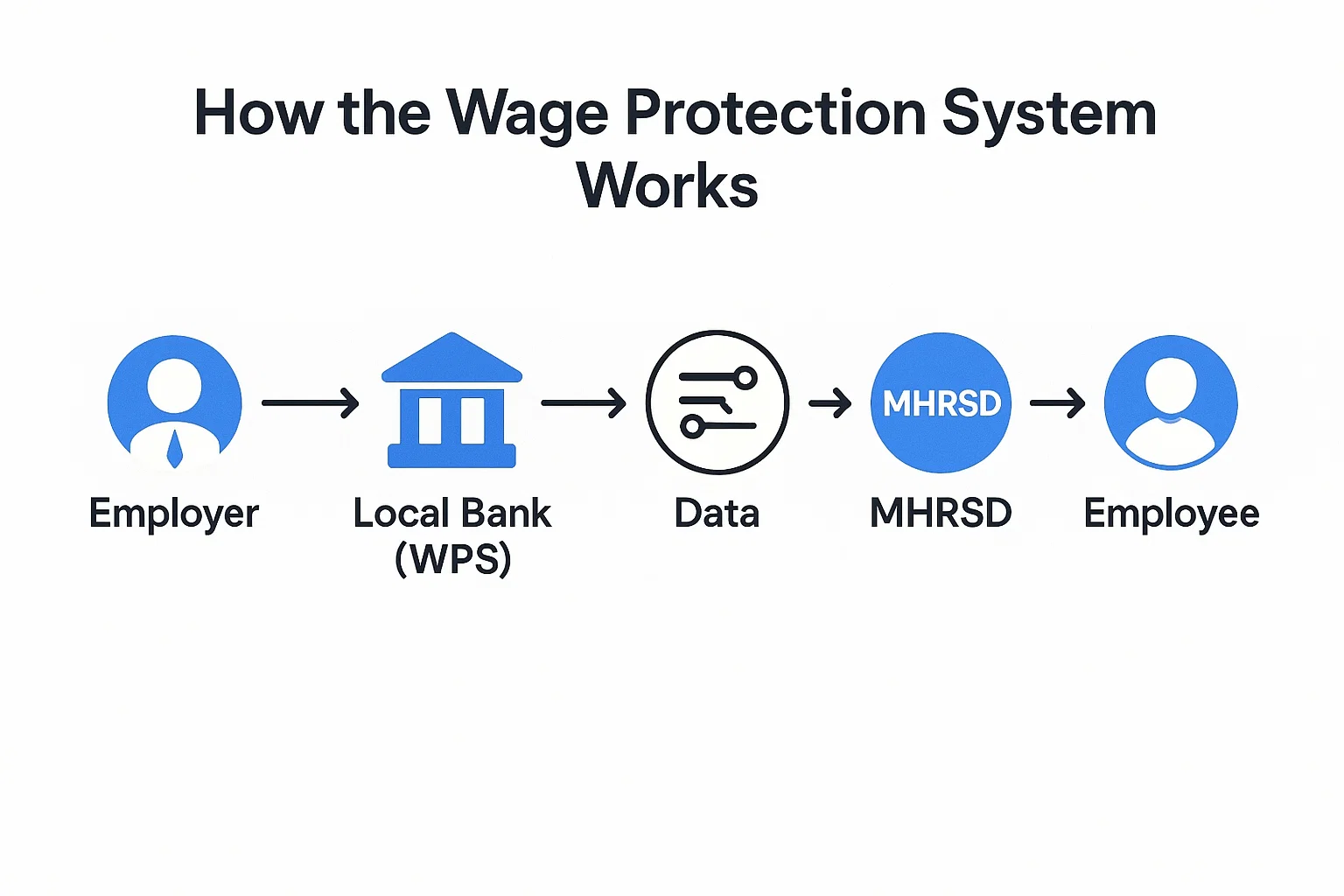Workers in Saudi Arabia frequently encounter delays in salary payments, unauthorized deductions, or outright non-payment, causing financial strain, family hardships, and workplace conflicts. Expatriate employees, dependent on remittances, suffer the most from these issues, often leading to disputes or legal actions. Employers risk penalties and reputational damage from non-compliance.
The Wage Protection System in Saudi Arabia offers a structured solution through electronic monitoring and enforcement, ensuring timely and transparent wage disbursements. This comprehensive article delves into the Wage Protection System in Saudi Arabia, covering its mechanisms, requirements, benefits, and updates. You'll gain actionable insights to address these challenges, achieve compliance, and foster fair labor practices.
Overview of the Wage Protection System in Saudi Arabia
The Wage Protection System in Saudi Arabia, known as WPS, is an electronic platform managed by the Ministry of Human Resources and Social Development. It mandates private sector employers to pay wages via approved banks and report transactions digitally.
This system applies to all employees, including Saudis and expatriates, building a centralized database for wage verification. The Wage Protection System in Saudi Arabia prevents exploitation by tracking payments and flagging irregularities.
Launched in phases since 2013, it has become a cornerstone of labor reforms, integrating with social insurance systems for seamless oversight.
History and Evolution of the Wage Protection System in Saudi Arabia
The Wage Protection System in Saudi Arabia began as a 2009 pilot targeting large firms to curb wage disputes. By 2013, mandatory implementation rolled out for companies with over 3,000 workers.
Expansion continued to medium and small enterprises, with deadlines based on employee numbers. The 2020 introduction of the Mudad platform automated processes for SMEs.
Recent enhancements include real-time alerts and stricter penalties, aligning with Vision 2030's focus on worker rights. The Wage Protection System in Saudi Arabia continues to adapt to digital payroll needs.
Key Objectives of the Wage Protection System in Saudi Arabia
Timely wage payments form the core objective of the Wage Protection System in Saudi Arabia, alleviating worker financial pressures and boosting morale. It promotes transparency in payroll operations.
- The system generates reliable data for policymakers to identify compliance trends and enforce laws. This supports equitable treatment across the workforce.
- By deterring unfair practices like excessive deductions, the Wage Protection System in Saudi Arabia contributes to a stable labor market and economic growth.
- It also encourages employers to adopt best practices, reducing litigation and enhancing business efficiency.
Operational Mechanics of the Wage Protection System in Saudi Arabia
Employers prepare payroll files detailing salaries, deductions, and allowances, then submit them to SAMA-approved banks for processing. Banks validate transfers and issue confirmations. These reports upload to the Ministry portal by the 10th of the following month. The Wage Protection System in Saudi Arabia automatically detects unpaid wages and prompts explanations. For discrepancies, employers respond within specified days; unresolved cases trigger investigations or penalties.
Processes for Large Enterprises under Wage Protection System
Large companies process high-volume payrolls directly through banks, bypassing Mudad in the Wage Protection System in Saudi Arabia. They generate files compliant with ministry standards.
Post-transfer, banks reconcile data and forward it for ministry review. The system scrutinizes patterns in large datasets for anomalies.
Robust internal systems help these firms maintain accuracy, with regular audits reinforcing adherence.
Registration Steps and Compliance in Wage Protection System Saudi Arabia
Businesses register via the Ministry portal using commercial registration and Qiwa credentials. Linking GOSI accounts follows for insurance integration.
Approved bank accounts handle all salary transfers in SAR. Monthly submissions require detailed breakdowns.
Key compliance elements include:
- Timely electronic transfers without cash payments.
- Itemized payslips shared with employees.
- Record retention for at least two years.
- Annual audits for high-risk sectors.
Non-registration halts operations like visa processing.
Consequences of Non-Compliance with Wage Protection System
Violations in the Wage Protection System in Saudi Arabia incur fines from SAR 3,000 per instance, escalating with repetition. Service suspensions follow persistent delays.
After 90 days of non-payment, employees can transfer jobs without notice. Inspections probe root causes.
The following table summarizes penalties:
These deter negligence effectively.
Latest Developments in Wage Protection System Saudi Arabia
2025 updates to the Wage Protection System in Saudi Arabia introduce alerts at 10 and 15 days for delays, with inspections at 20 days. Mudad now detects illogical pay structures.
Mandatory digitized contracts and 15-day dispute resolutions strengthen protections. Employers must justify delays with employee verification.
These changes automate enforcement, reducing manual interventions and enhancing accuracy.
Strategies for Effective Compliance in Wage Protection System
Designate payroll specialists and automate file preparations in the Wage Protection System in Saudi Arabia. Integrate HR software with bank APIs.
Monitor ministry announcements for updates and train staff regularly. Quarterly self-audits catch issues early.
For SMEs, maximize Mudad's analytics, larger firms should customize dashboards. Clear policies on deductions prevent violations.

Broader Impacts of the Wage Protection System in Saudi Arabia
Workers gain empowerment against exploitation, with faster resolutions to grievances. This stability aids family planning and remittances.
Businesses enjoy predictable operations, easier scaling, and better talent retention. The system curbs informal economies.
Challenges like digital divides persist, but training initiatives address them. Ultimately, the Wage Protection System in Saudi Arabia drives inclusive development.
In conclusion, mastering the Wage Protection System in Saudi Arabia ensures smooth operations and legal security. Proactive compliance yields long-term benefits for all stakeholders.









%2520in%2520Saudi%2520Arabia.jpeg)



.webp)















